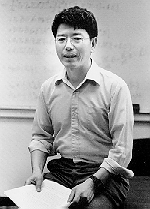
Kuniharu Kubodera
Professor
PSC 702FPhysics and Astronomy
University of South Carolina
Columbia, South Carolina 29208
(803) 777-5274
Education
- Ph. D. (Physics), University of Tokyo, Japan (1970)
- M. Sci. (Physics), University of Tokyo, Japan (1968)
- B. Sci. (Physics Major), University of Tokyo, Japan (1966)
Research Interests
Theoretical Nuclear Physics and Nuclear Astrophysics Among the primary goals of nuclear physics are: (1) Understanding many-body hadronic phenomena in terms of fundamental constituents and their interactions; (2) Extracting information on the elementary processes using nuclei as natural laboratories. As the meaning of "fundamental" and "elementary" changes, the domain and methodology of nuclear physics are steadily expanding. I list below two of my recent main research areas. Effective Field Theory Approach to Nuclear Physics --- With the advent of quantum chromodynamics (QCD) as a fundamental theory of strong interactions, a big challenge is to make connection between nuclear phenomena and QCD. Effective field theory provides a powerful tool for tackling this problem; in particular, nuclear chiral perturbation theory has been revealing many interesting consequences of chiral symmetry for low-energy nuclear phenomena. Our work in this domain is primarily concerned with: (i) Nuclear exchange currents; (ii) Ab initio calculations of electroweak processes in few-body systems; (iii) Extension of nuclear chiral perturbation theory to higher energy-momentum transfer regimes. Nuclear Astrophysics --- Astrophysical processes often depend on the behavior of nuclear systems under extreme conditions (ultra-high temperature, ultra-high pressure, etc.). We have been trying to deepen our understanding of these exotic systems; for instance, we are studying the possibility of strangeness condensation in a dense medium and its consequences in astrophysical phenomena and heavy-ion collisions. In neutrino astrophysics reliable estimates of neutrino-nucleus reaction cross sections are crucially important. Our group has been actively engaged in theoretical studies of these reactions.
Selected Publications
- "Neutrino reactions on deuteron," Phys. Rev. C, 63, 034617 (2001), with S. Nakamura, T. Sato and V. Gudkov.
- "Capture rate and neutron helicity asymmetry for ordinary muon capture in hydrogen," Phys. Rev. C, 63, 015203 (2001), with S. Ando and F. Myhrer.
- "Effective field theory for nuclei: Confronting fundamental questions in astrophysics," Nucl. Phys. A, 684, 101 (2001), with T.-S. Park, D.-P. Min and M. Rho.
- "Effective field theory approach to n+p → d+γ at threshold," Phys. Lett. B, 472, 232 (2000), with T.-S. Park, D.-P. Min and M. Rho.
- "The power of effective field theories in nuclei: the deuteron, NN scattering and electoweak processes," Nucl. Phys. A, 646, 83 (1999), with T.-S. Park, D.-P. Min and M. Rho.